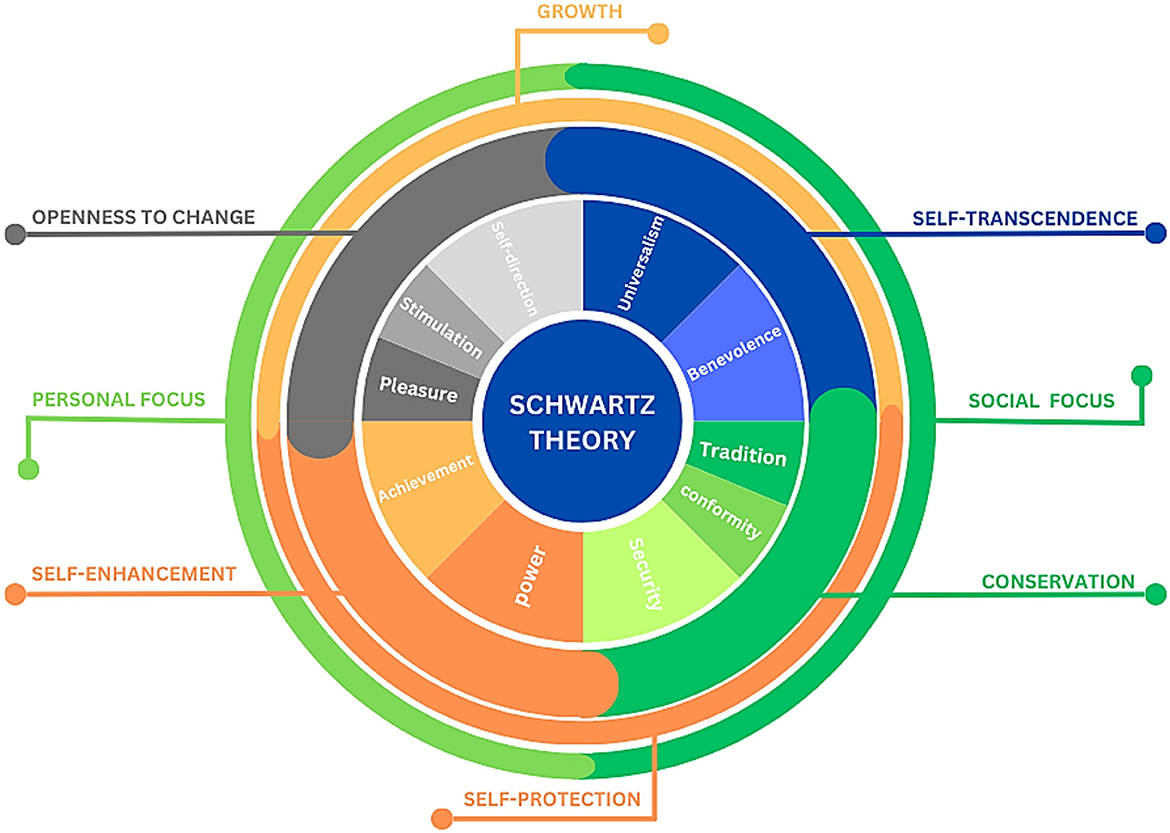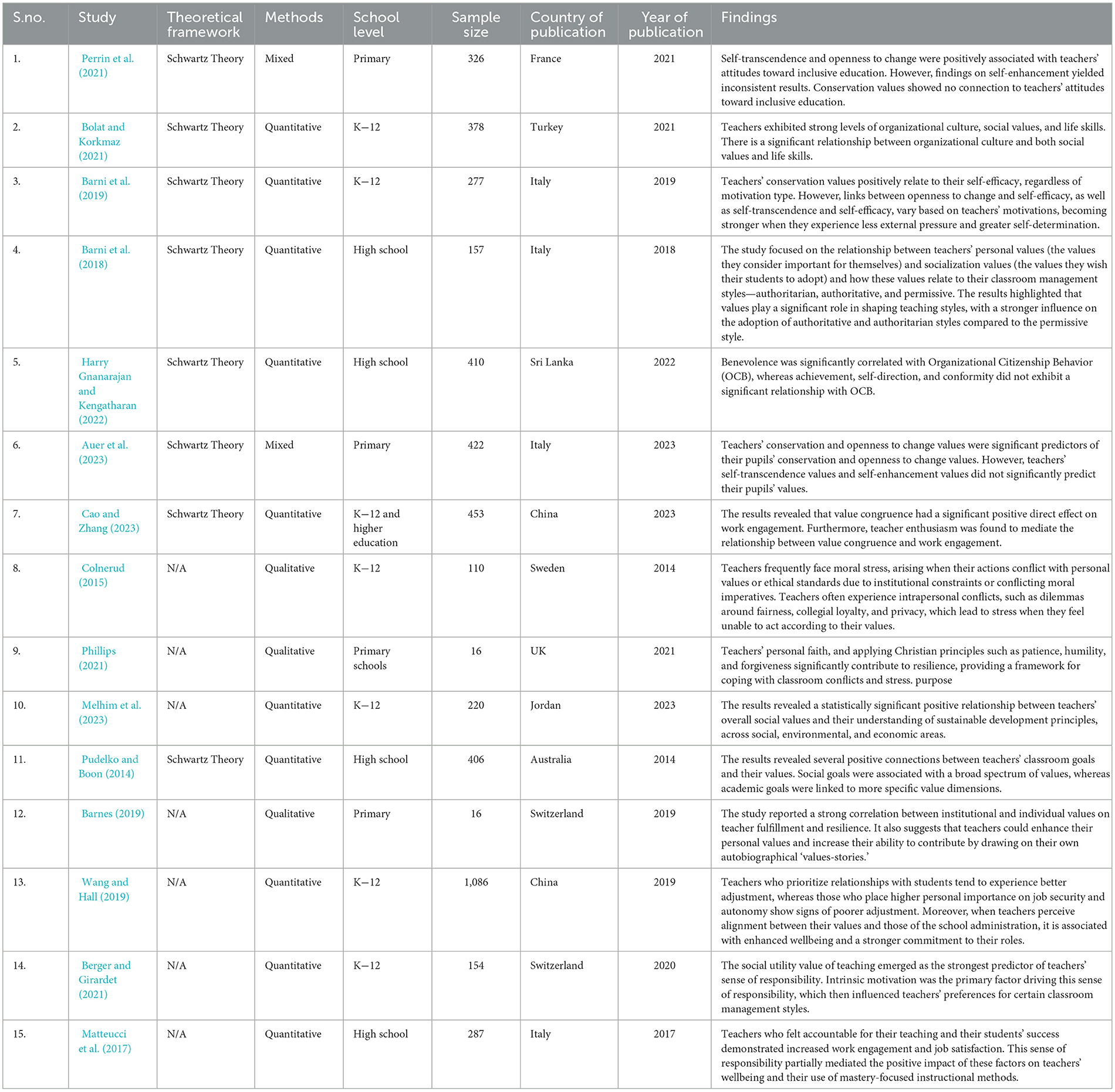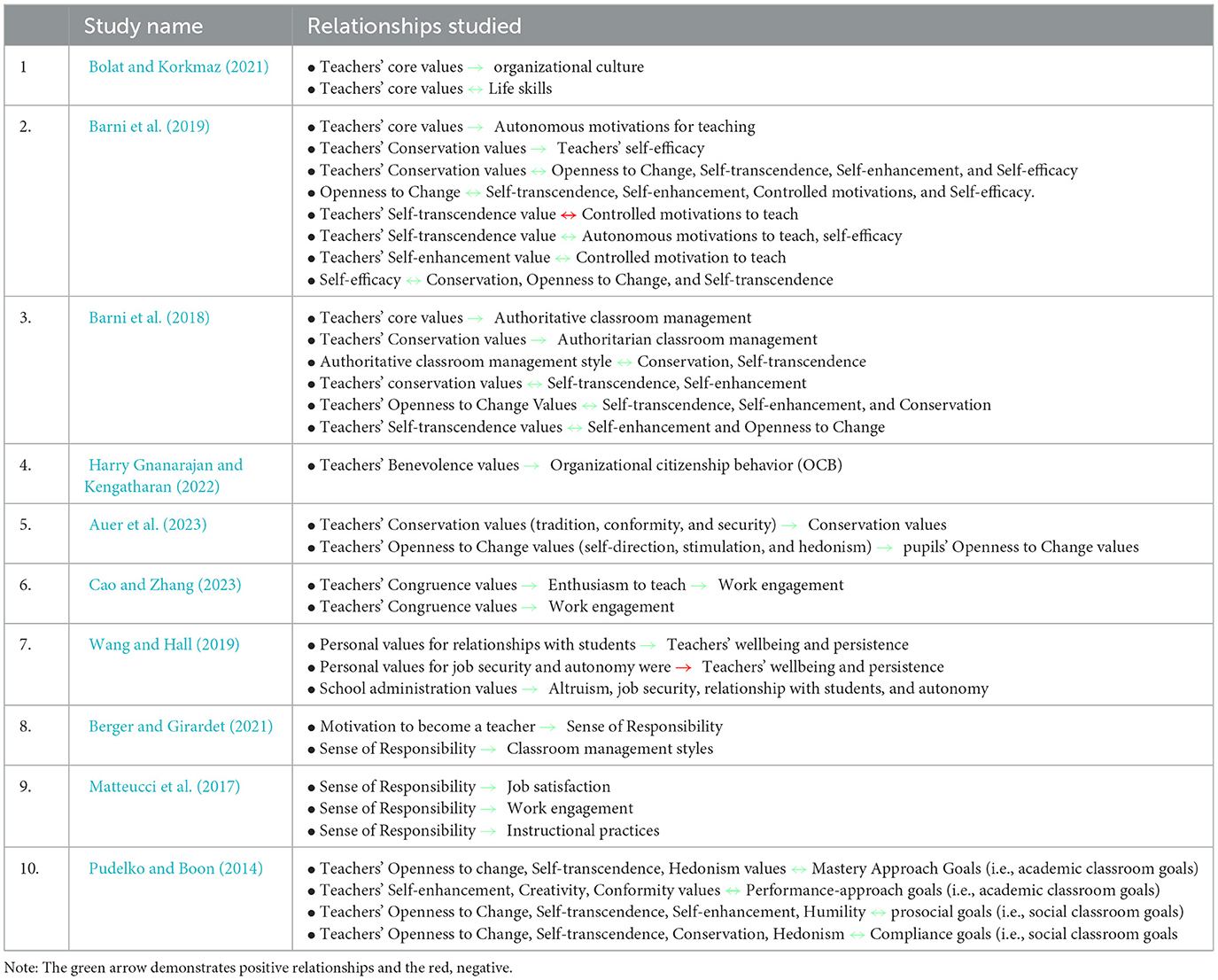- 1Department of Educational Sciences, College of Education, Qatar University, Doha, Qatar
- 2Educational Research Center, College of Education, Qatar University, Doha, Qatar
Introduction: Teachers' personal and social values are key determinants of their goals, behaviors, and interactions within the school environment. This systematic review explores the values upheld by K−12 teachers, examining their impact on teachers' wellbeing and their professional outcomes. Anchored in Schwartz's theory of human values, this study investigates the close and complex relationships between teachers' core values—namely, conservation, openness to change, self-transcendence, and self-enhancement—and their subsequent influence on wellbeing and professional outcomes.
Methods: Employing the PRISMA methodology, this review identifies, screens, and shortlists relevant articles, ultimately selecting 15 research articles for inclusion.
Results: The analysis reveals the prevalence of 10 essential human values held by teachers, with benevolence being the most extensively examined value (n = 15), followed by achievement values (n = 12). These values shape salient aspects of teachers' professional lives, encompassing their wellbeing, instructional effectiveness, classroom management abilities, work engagement, job satisfaction, and self-efficacy. Specifically, teaching effectiveness (n = 5) and classroom management skills (n = 3) were found to be the most influenced by these core values.
Discussion: This research provides valuable insights for policymakers and educational leaders, offering a framework for fostering environments that help teachers cultivate values conducive to their wellbeing and professional success. The results serve as a guide for the development of policies and educational strategies that aim to enhance teacher satisfaction, promote teaching self-efficacy, and optimize classroom management practices.
1 Introduction
Values form the cornerstone of educational practices, shaping the content taught and the manner in which it is delivered and received. The extant literature defines values as enduring beliefs that influence attitudes and behaviors, guiding individuals in determining what is important and desirable (Schwartz, 2013). Values reflect personal aspirations and hold social significance. They play a critical role in shaping the decisions individuals make, guiding their actions and the intentions they pursue (Páez Gallego et al., 2020). Moreover, these values are instrumental in the formation of attitudes and facilitate social adaptation, serving as a foundational framework that governs both individual and collective human behavior (Feather, 2021).
Social values, in particular, consist of general beliefs that emerge as a result of the intersection of individual values, collective thought, and the participation of individuals as social entities within groups or communities (Lake et al., 2021). Social values, especially those governing the behavior of teachers and students, contribute to the cohesion, sustainability, and stability of society (Suyato et al., 2024). By guiding behaviors and promoting societal goals, social values help mitigate excessive self-interest and foster cooperation and social integration (Santos and Lousã, 2022). Thus, personal and social values serve as a foundation for determining acceptable or desirable behaviors within a given community.
Values held by individuals have long been a focal point of scholarly research across diverse psychological disciplines, including social, developmental, and educational psychology (Howard, 1985). For teachers, values are particularly significant as they directly influence their wellbeing, motivation, and professional behaviors. These values shape how teachers interact with students, manage classrooms, and approach instructional practices (Auer et al., 2023; Melhim et al., 2023). Understanding teachers' values is essential for improving their work engagement, job satisfaction, and resilience, as well as for fostering positive student outcomes (Cao and Zhang, 2023).
Adapting education to meet evolving societal and individual needs helps mitigate the potential negative impacts that often accompany periods of educational transformation (Cooper et al., 2023; Lacey et al., 2024). In this regard, studies focusing on the values held by teachers and the transmission of these values to students are integral to fostering a positive and effective educational environment. They also support broader transformations within education by promoting cohesion and aligning teaching practices with societal goals.
Despite the evident importance of values in educational contexts, there is an evident lack of comprehensive research systematically examining the specific types of values held by K−12 teachers and their impact. Existing studies have often explored values in fragmented ways, typically focusing on singular aspects such as their role in workplace dynamics, wellbeing, or their influence on specific behaviors (Berger and Girardet, 2021; Harry Gnanarajan and Kengatharan, 2022; Perrin et al., 2021; Phillips, 2021). However, it appears that no published systematic review is available that provides a holistic understanding of the diverse values that guide K−12 teachers and how these values shape their personal wellbeing. This gap in the literature limits the ability to better appreciate the interaction between teachers' values and their broader professional experiences, leaving policymakers, educators, and researchers with an incomplete framework for supporting teachers.
This present study aims to fill this gap by systematically reviewing the various values upheld by K−12 teachers and examining their relationship with teachers' wellbeing and professional outcomes. By doing so, it seeks to offer valuable insights into how fostering certain values can enhance teachers' wellbeing, satisfaction, resilience, and effectiveness in educational environments. The findings of this study have significant implications for teacher training and professional development programs. By understanding the relationship between teachers' values and their professional outcomes, these programs can be tailored to foster values that enhance teacher effectiveness and wellbeing, ultimately leading to improved educational experiences for students. This review seeks to answer the following research questions:
RQ 1: What theoretical frameworks underpin the core values held by K−12 teachers?
RQ 2: What are the different types of values held by K−12 teachers?
RQ 3: How do the diverse personal and social values embraced by teachers impact their wellbeing and professional performance?
RQ 4: What are the established significant relationships that exist between teachers' core values and their wellbeing and professional outcomes?
2 Theoretical framework
The study of basic human values has spanned decades, beginning with foundational work by Allport in 1931 and continuing to the present (Allport, 1960). According to Kluckhohn (1951), values are the conception, explicit or implicit, distinctive of an individual or a group where they prioritize and choose actions based on what they perceive as desirable or important. The term “values” has been broadly applied to encompass interests, preferences, pleasures, moral obligations, desires, goals, needs, aversions, and other selective orientations (Williams, 1979).
Rokeach (1973) established a theoretical link between values and behavior, operationalizing this relationship through the development of the Rokeach Value Survey, which ranks values to define their conceptual importance. Building on these foundational theories, Schwartz's Value Theory (1992) emerged as one of the most comprehensive and globally validated frameworks for understanding values. Schwartz (1994) described values as “desirable trans-situational goals, varying in importance, that serve as guiding principles in the life of a person or other social entity”. His theory posits that these values interact in a circular structure, with adjacent values being compatible and opposite values potentially conflicting. For instance, benevolence and universalism are closely related and often reinforce each other, while achievement and benevolence may sometimes be at odds.
Schwartz further categorized values into 10 distinct types, organized within a circular continuum of conflicts and compatibilities under four overarching dimensions: self-transcendence, self-enhancement, openness to change, and conservation (Schwartz, 2012). Self-transcendence and conservation emphasize a social perspective, while self-enhancement and openness to change prioritize an individual perspective. This framework offers a perspective on how values influence individual and collective behavior, serving as a cornerstone for contemporary value research (see Figure 1). By applying Schwartz's Value Theory to teachers, researchers can better understand how specific values shape professional outcomes, enabling targeted interventions to enhance teachers' wellbeing and effectiveness in the classroom.
3 Methods
3.1 Search strategy
Relevant research articles were retrieved from databases such as Web of Science, Educational Resources Information Center (ERIC), and Scopus. To streamline the search, carefully selected keywords were constructed using Boolean operators: TITLE-ABS-KEY: (“social values” OR “cultural values” OR “moral values” OR “morals” OR “human values” OR “personal values”) AND (“teachers” OR “tutors” OR “mentors” OR “educators”). The systematic review followed the Preferred Reporting Items for Systematic Reviews and Meta-Analyses (PRISMA) guidelines (Page et al., 2021) to systematically identify, screen, and select relevant studies. The PRISMA approach was implemented in three distinct stages, as depicted in Figure 2.
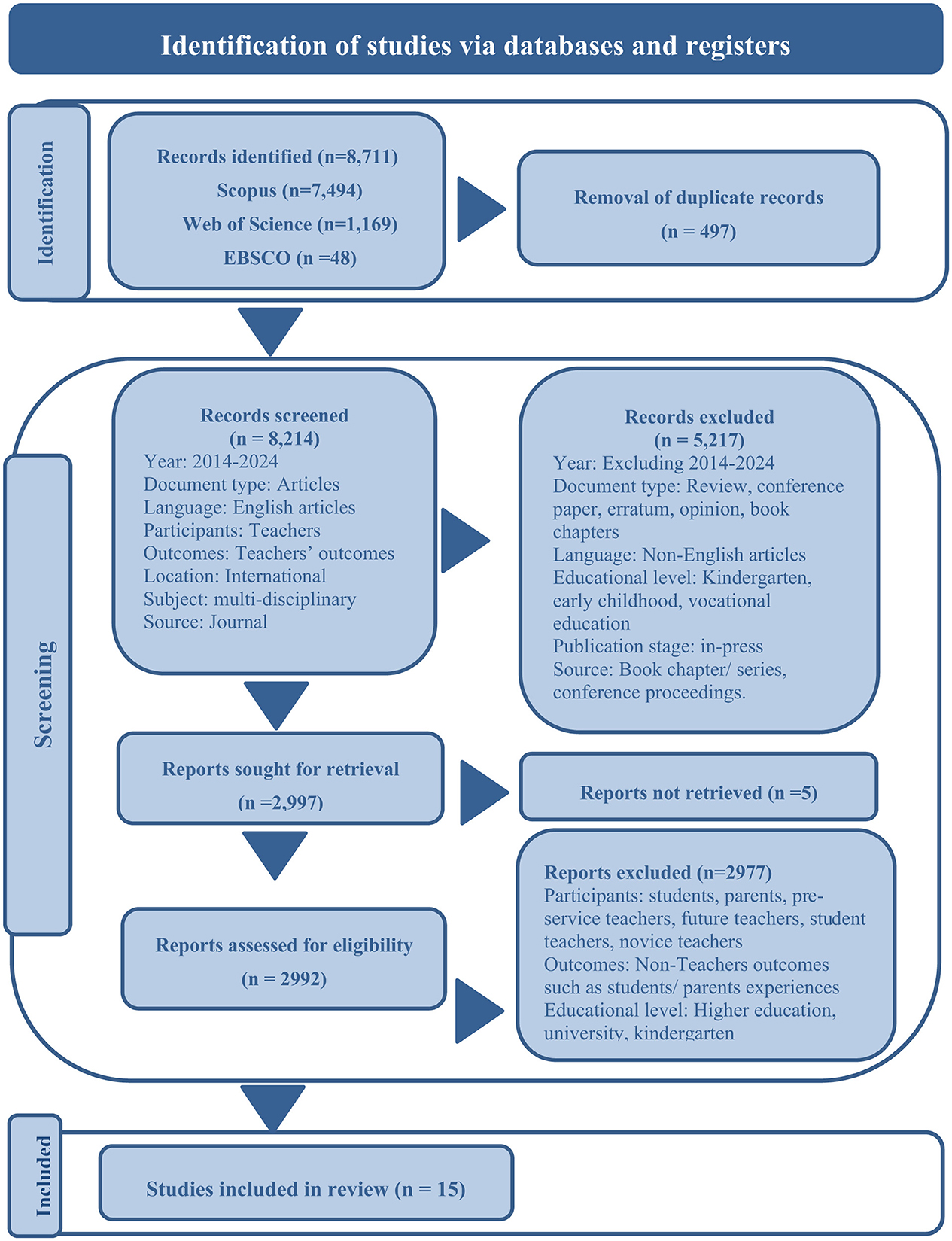
Figure 2. PRISMA methodology showcasing the identification and screening process of the relevant articles.
While the PRISMA methodology provides a robust framework for systematic reviews, it is important to acknowledge its limitations in this context. The focus on peer-reviewed articles may exclude valuable insights from gray literature or unpublished studies. Additionally, the methodology's emphasis on quantitative data may not fully capture the subtle, qualitative aspects of teachers' values and their personal experiences. An initial search with the specified keywords yielded 8,711 articles across Scopus (n = 794), EBSCO (n = 48), and Web of Science (n = 1,169). After exporting the results, duplicate entries (n = 497) were removed. The remaining articles were screened based on the relevance of their titles and abstracts, followed by an in-depth review of their content to ensure alignment with the review's scope. This selection process adhered to predefined inclusion and exclusion criteria.
Data extraction was conducted using a standardized template to maintain consistency. Key details such as study design, participant characteristics, and reported outcomes were systematically recorded. Two researchers independently reviewed the extracted data, assessed each article, and engaged in collaborative discussions to achieve consensus. In cases of disagreement, a third reviewer was consulted to reach a consensus. This approach ensured a thorough and unbiased evaluation of the selected studies, ensuring the reliability and validity of the analysis.
3.2 Inclusion/exclusion criteria
The systematic review adopted clearly defined inclusion criteria to ensure the selection of relevant articles. It considered empirical research published between 2014 and 2024, focusing exclusively on studies written in English and targeting K−12 in-service teachers. In this study, the term K−12 teacher refers to educators teaching from 1st through 12th grade, which typically includes students aged ~5–18 years old, covering primary and secondary education in the United States and similarly structured systems. To capture a global perspective, studies conducted in diverse international contexts were included. The review prioritized research with outcomes directly relevant to school teachers, emphasizing their professional development and impact. Furthermore, only fully published, peer-reviewed articles in their final version were included to guarantee the reliability and rigor of the selected studies.
The systematic review also applied exclusion criteria to ensure the selection of studies aligned with its objectives. Articles published outside the 2014–2024 timeframe were excluded to ensure the inclusion of the most recent studies. Additionally, articles written in languages other than English or categorized as reviews, conference papers, errata, opinion pieces, or book chapters were omitted. Studies focusing on educational levels such as kindergarten, early childhood education, vocational education, or higher education, as well as those involving participants like students or parents instead of K−12 in-service teachers, were excluded. Additionally, research emphasizing outcomes unrelated to teachers, such as student or parent experiences, was not considered. Thus, finally, based on the inclusion-exclusion criteria, 15 relevant articles were shortlisted for the review.
Table 1 presents a summary of the key characteristics of the 15 studies included in this systematic review. The table encompasses essential details for each study, including the study's name, research design, teachers' educational level, sample size, country, and year of publication, and key findings.
3.3 Reliability test
To ensure reliability in the article selection process for this systematic review, Cohen's Kappa coefficient was employed via SPSS software to evaluate inter-rater reliability between two independent reviewers. These authors independently screened and shortlisted articles based on pre-established criteria, including relevance, study design, language, participant characteristics, study outcomes, and publication status. As a statistical measure, Cohen's Kappa assesses the level of agreement between reviewers beyond random chance. The coefficient yielded a value of 0.77 (p = 0.002) during the screening phase, signifying substantial agreement. This robust agreement in applying inclusion and exclusion criteria validates the reliability of the selection process, reinforcing the methodological transparency and rigor of the systematic review.
Figure 3 presents the distribution of the included studies based on: (a) the research methodology employed, (b) the educational level of participating teachers, and (c) the country of publication. Quantitative research designs emerged as the most commonly employed approach, accounting for the majority of studies (n = 15), followed by qualitative research designs (n = 3). In terms of geographical distribution, the largest number of studies were published in Italy (n = 4), followed by China and Switzerland (n = 2). Regarding the educational levels of participating teachers, the majority of the shortlisted articles included data from K−12 teachers, encompassing both primary and high school educators (n = 7).
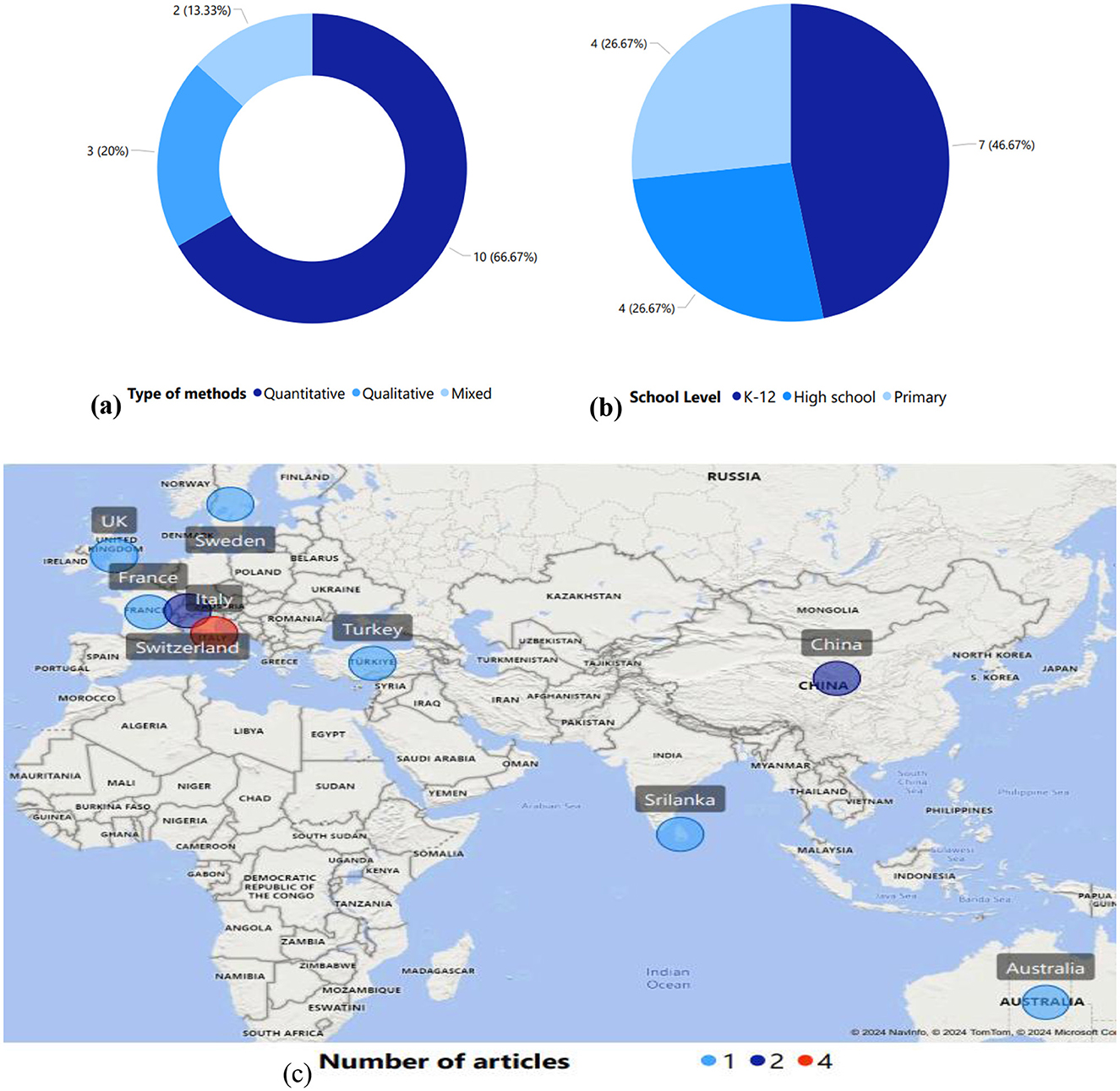
Figure 3. Number of shortlisted articles (a) by research methodology, (b) by educational level of participant teachers, and (c) by country of publications.
4 Results
4.1 RQ 1: what theoretical frameworks underpin the core values held by K−12 teachers?
The analysis of the reviewed studies reveals that eight articles utilized Schwartz's Theory of Basic Human Values (1992, 1994) as a theoretical lens to explore K−12 teachers' core values and the outcomes associated with them (Auer et al., 2023; Barni et al., 2019, 2018; Bolat and Korkmaz, 2021; Cao and Zhang, 2023; Harry Gnanarajan and Kengatharan, 2022; Perrin et al., 2021; Pudelko and Boon, 2014). According to Schwartz, values are broad, overarching goals that serve as guiding principles in individuals' lives. His theory outlines ten fundamental value types: (1) Power—the pursuit of social status and control over resources; (2) Achievement—striving for personal success in accordance with societal norms; (3) Hedonism—seeking pleasure and sensory gratification; (4) Stimulation—valuing excitement and novelty; (5) Self-direction—emphasizing independent thought and action; (6) Benevolence—promoting the welfare of close others; (7) Universalism—fostering understanding, tolerance, and concern for all people and nature; (8) Tradition—respecting cultural or religious customs; (9) Conformity—adhering to social norms to avoid harming others or disrupting order; and (10) Security—ensuring safety, stability, and harmony within society and personal relationships. Table 1 provides an overview of how this value framework has been operationalized in previous studies to examine educationally relevant outcomes.
In later work, Schwartz (2012) noted that values such as self-transcendence and conservation emphasize a social focus, prioritizing outcomes for individuals, the community, or established institutions. In contrast, self-enhancement and openness to change reflect a personal focus, centering on individual outcomes. In other words, values associated with openness to change and self-enhancement drive behaviors that advance personal interests, while self-transcendence and conservation values guide social interactions and relationships. Moreover, openness to change and self-transcendence foster self-expansion and growth, whereas self-enhancement and conservation emphasize self-protection and preservation.
4.2 RQ 2: what are the different types of values held by K−12 teachers?
Through thematic analysis, ten core values were identified as integral to K−12 teachers, each playing a significant role in shaping their wellbeing and professional outcomes. These values include power, achievement, hedonism, stimulation, self-direction, benevolence, universalism, tradition, conformity, and security. The detailed focus of each value is outlined in Table 2. Among these, teachers' benevolence value stands out as the most significant value, as evidenced by its prominence in the majority of the reviewed articles (n = 15). These studies emphasize its key role in promoting teachers' wellbeing and enhancing their professional effectiveness. Following benevolence, the value of achievement ranks as the second most influential category (n = 12), while universalism and tradition share the third position, each highlighted in 11 studies (Refer to Figure 4).
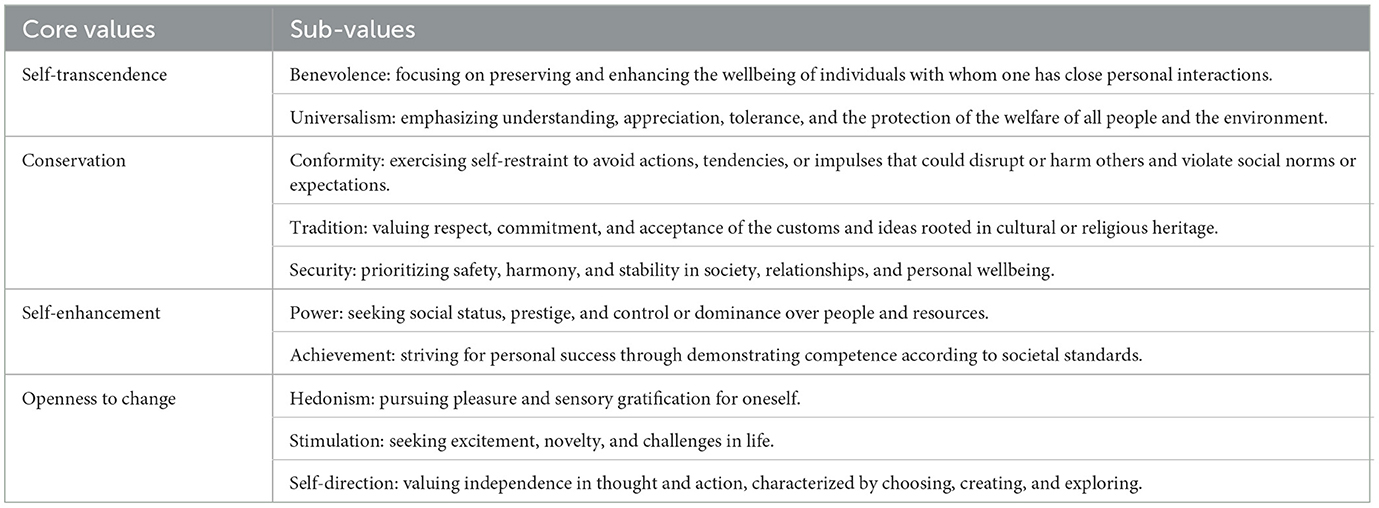
Table 2. Schwartz's (1992) four higher-order core human values and the 10 sub-values.
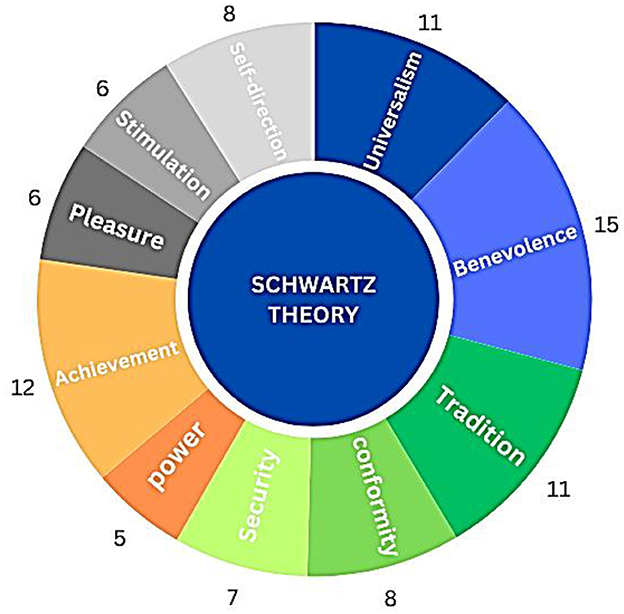
Figure 4. Graphical representation of the number of articles showcasing the categories of values held by K−12 teachers.
Teachers with strong benevolence values might prioritize students' emotional wellbeing, offering extra support outside of class hours. Those with high achievement values may set challenging academic goals and provide detailed feedback to help students excel. Our analysis reveals complex relationships between different value types. For example, teachers who score high in both benevolence and achievement tend to create supportive yet academically rigorous classroom environments. In contrast, those with strong power values combined with low universalism may struggle with inclusive teaching practices. These findings reveal that a set of values shape teachers' experiences, both personally and professionally, highlighting the multidimensional nature of their roles and responsibilities. The details of how these values impact teachers' wellbeing and professional outcomes are addressed under the third research question.
4.3 RQ 3: how do the diverse personal and social values embraced by teachers impact their wellbeing and professional performance?
Studies have established that K−12 teachers embrace the full spectrum of values delineated in Schwartz's theory. These values significantly influence various dimensions of their wellbeing, including job satisfaction, work engagement, and resilience, as well as their professional performance outcomes. These professional outcomes encompass teachers' teaching, self-efficacy, classroom management styles/goals, alignment with organizational culture, promotion of student values, attitudes toward inclusive education, and comprehension of principles related to sustainability (Figure 5).
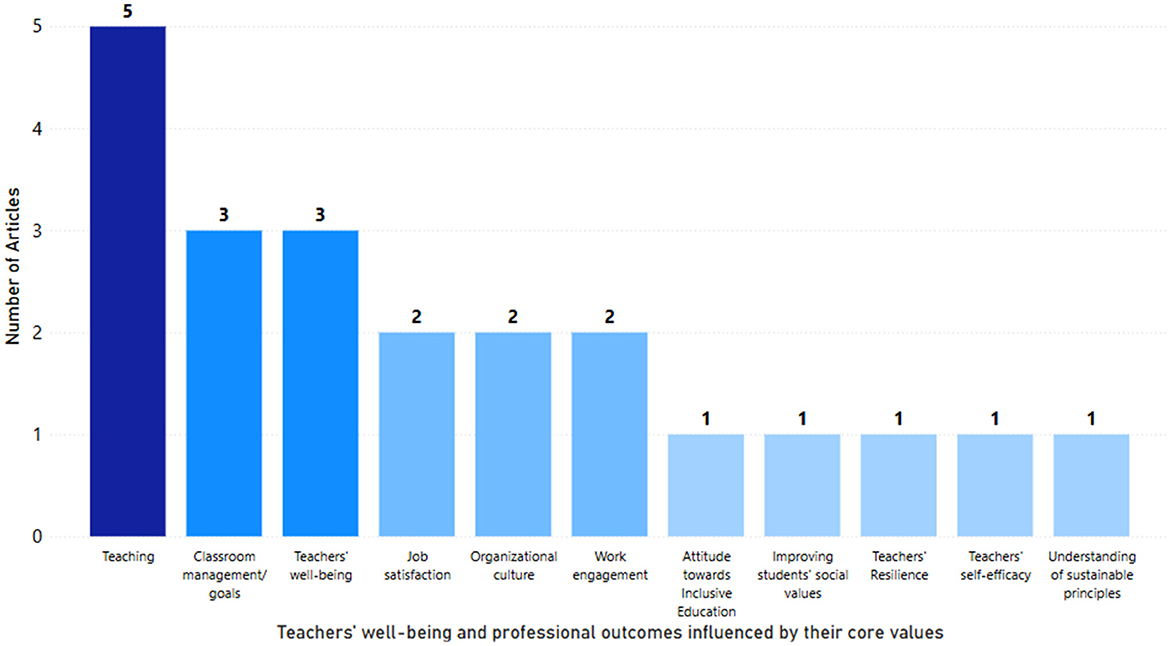
Figure 5. Graphical representation of the articles showcasing the categories of teachers' wellbeing and professional outcomes impacted by their values.
The majority of the reviewed literature (n = 5) demonstrates the critical role of teachers' core values in shaping and enhancing their teaching practices (Barni et al., 2019; Berger and Girardet, 2021; Cao and Zhang, 2023; Colnerud, 2015; Matteucci et al., 2017). Furthermore, classroom management and teachers' wellbeing were explicitly linked to teachers' core values (n = 3 respectively) Additionally, two studies highlighted the influence of teachers' core values on job satisfaction (Matteucci et al., 2017; Wang and Hall, 2019), alignment with organizational culture (Bolat and Korkmaz, 2021; Harry Gnanarajan and Kengatharan, 2022), and work engagement (Cao and Zhang, 2023; Matteucci et al., 2017). Other wellbeing and professional outcomes, including contributions to inclusive education and sustainability, were explored in a limited number of studies (n = 1 for each) (Auer et al., 2023; Barni et al., 2019; Melhim et al., 2023; Perrin et al., 2021; Phillips, 2021). These findings collectively affirm the impact of teachers' personal and social values and their wellbeing and professional outcomes.
4.4 RQ 4: what are the established significant relationships that exist between teachers' core values and their wellbeing and professional outcomes?
Understanding the significant relationships between the core values held by K−12 teachers and their wellbeing and professional outcomes requires examining how these values influence key aspects of their professional lives. Schwartz's theory identifies four overarching categories of values—poi Self-transcendence, Self-enhancement, Openness to Change, and Conservation—each of which impacts teachers' motivation, classroom management, and the organizational culture in their schools (Barni et al., 2018, 2019; Bolat and Korkmaz, 2021). The following section details how each of the four core values held by teachers impacts their wellbeing and professional outcomes.
Impact of teachers' self-transcendence values: According to Harry Gnanarajan and Kengatharan (2022), Self-transcendence values (Benevolence and Universalism), which emphasize understanding, appreciation, tolerance, and care for others, have a profound impact on teachers' Organizational Citizenship Behavior (OCB). OCB refers to voluntary, extra-role behaviors that contribute positively to the school environment, such as assisting colleagues, supporting students beyond their required duties, and fostering a collaborative culture. Although these behaviors are not formally rewarded, they are essential for creating an effective and supportive educational environment. It has also been reported that teachers' self-transcendence values significantly enhance their autonomous motivation to teach (Barni et al., 2019).
Similarly, Cao and Zhang (2023) found that teachers' congruence value—the alignment between individual and organizational values—positively influences their enthusiasm for teaching, leading to greater work engagement and job satisfaction. This alignment also fosters collaborative efforts toward sustainability and ethical practices (Melhim et al., 2023; Perrin et al., 2021). Understanding these dynamics is essential for educational systems aiming to cultivate a cohesive and motivated workforce, as these values not only guide individual actions but also contribute to overall institutional growth.
Fostering better relationships with students strengthens teachers' wellbeing and persistence, providing a sense of fulfillment and purpose. Teachers' values that reflect a strong sense of responsibility, as identified by Berger and Girardet (2021), are positively linked to their classroom management skills, job satisfaction, work engagement, and teaching self-efficacy. These values enable teachers to handle classroom challenges effectively, maintain a productive learning environment, and feel confident in their instructional abilities, all of which contribute to both their professional success and personal wellbeing.
Impact of teachers' self-enhancement values: Teachers' self-enhancement values (achievement and power), emphasizing competence, dominance, and success significantly influence their motivation, professional outcomes, and wellbeing. According to Barini, self-enhancement values positively correlate with teachers' autonomous and controlled motivation to teach (Barni et al., 2019). Autonomous motivation arises from intrinsic satisfaction and alignment with personal values, while controlled motivation is driven by external expectations. Teachers with strong self-enhancement values are more likely to feel motivated to excel in their roles, as their drive for achievement and recognition supports their professional success (Barni et al., 2019). Furthermore, Pudelko and Boon (2014) highlight that self-enhancement values align with performance-approach goals and prosocial goals. Performance approach goals focus on demonstrating competence and achieving success, often by setting high standards for students, while prosocial goals emphasize contributing to the wellbeing of students and the broader school community. This suggests that self-enhancement values, while centered on personal ambition, also promote behaviors that benefit others.
Impact of teachers' openness to change values: Teachers' openness to change (self-direction, stimulation, and hedonism), reflects their inclination toward independent thinking, exploration, seeking pleasure, and overcoming challenges. These values are significant not only for the teachers themselves but also for their ability to effectively transmit similar values to their students (Auer et al., 2023). Teachers who value openness to change are more likely to encourage creativity, curiosity, and critical thinking in their students, fostering an environment where learners feel inspired to explore new ideas and overcome obstacles. According to Pudelko and Boon (2014), teachers' openness to change values significantly influences their prosocial classroom goals, compliance goals, and mastery approach goals.
Prosocial classroom goals focus on promoting a supportive and inclusive learning environment, encouraging collaboration and respect among teachers and students (Pudelko and Boon, 2014). Compliance goals emphasize fostering a structured and disciplined classroom where students follow rules and routines effectively (Pudelko and Boon, 2014). This reduces the cognitive and emotional load associated with managing behavioral challenges, allowing teachers to focus more on teaching and less on disciplinary actions, thereby improving their job satisfaction and resilience. Mastery approach goals, on the other hand, prioritize helping students develop a deep understanding of concepts and a focus on learning rather than performance (Pudelko and Boon, 2014). By integrating these goals into their teaching practices, teachers not only enhance their own wellbeing and professional outcomes but also contribute to a thriving educational environment that benefits their students.
Impact of teachers' conservation values: Teachers' conservation values (conformity, tradition, and security) which focus on self-restraint to avoid harm, respect for cultural and traditional norms, and prioritization of safety and harmony are particularly significant for K−12 teachers. These values not only guide their professional behavior but also positively influence their students' development of similar values (Barni et al., 2019). Teachers with strong conservation values are more likely to promote respect, order, and stability within the classroom, fostering a harmonious learning environment. By modeling these values, teachers play a critical role in shaping students' attitudes toward preserving harmony and adhering to social expectations (Barni et al., 2019).
Additionally, conservation values significantly impact teachers' self-efficacy and classroom management (Auer et al., 2023; Barni et al., 2018). Teachers who embrace conformity, tradition, and security are better equipped to maintain discipline, establish clear routines, and create a structured and predictable classroom environment (Auer et al., 2023; Barni et al., 2018). This not only enhances their confidence in managing classroom dynamics but also promotes a sense of safety and consistency for students, which is essential for effective learning (Auer et al., 2023; Barni et al., 2018).
The interaction between teachers' personal and social values and their professional outcomes is complex. There also exists co-relations between the four core values held by the teachers (see Table 3). Teachers' core values not only influence their own wellbeing and job satisfaction but also have a significant impact on their classroom practices and the learning environment they cultivate. The findings of this review highlight the need for educational policies and professional development programs to acknowledge the importance of teachers' values and align them with organizational cultures to enhance both teacher wellbeing and student outcomes.
5 Discussion
The present systematic review of research on K−12 teachers' values provides valuable insights into how personal and social values shape their wellbeing and professional outcomes. By utilizing Schwartz's Theory of Basic Values as a framework, this study has identified ten core values that influence teachers' behaviors, motivations, and interactions within educational settings. The findings highlight the importance of values such as benevolence and achievement, which are key to enhancing teachers' effectiveness, job satisfaction, and overall wellbeing. These core values often interact in complex ways, influencing teachers' professional outcomes and wellbeing. For instance, the interaction between self-transcendence and self-enhancement values can shape teachers' motivations and behaviors in significant ways. These are listed below:
a) Core Values and Their Impact: The review highlights that benevolence emerged as the most prevalent value among K−12 teachers, reflecting a strong inclination toward promoting the welfare of others (Barni et al., 2018, 2019; Bolat and Korkmaz, 2021). The value of benevolence is closely linked to various positive outcomes, including increased job satisfaction and enhanced classroom management skills (Harry Gnanarajan and Kengatharan, 2022; Pudelko and Boon, 2014). Teachers who prioritize benevolence are more likely to engage in behaviors that foster a supportive learning environment, thereby positively influencing student outcomes. In addition to benevolence, achievement values also play a crucial role in shaping teachers' professional experiences. The desire for personal success and recognition drives teachers to set high standards for themselves and their students. This intrinsic motivation not only enhances their teaching practices but also contributes to a culture of excellence within the classroom (Bolat and Korkmaz, 2021; Cao and Zhang, 2023).
While benevolence was particularly dominant in Western contexts (e.g., Italy, Switzerland; 60% of studies), research from China (Cao and Zhang, 2023) revealed a stronger emphasis on conformity and security values closely tied to collectivist educational norms and state-driven expectations for classroom discipline, social harmony, and national identity.
Figure 3 illustrates that 87% of the reviewed studies focused on Western contexts, which may partially explain the prominence of individual-oriented values such as universalism and self-direction. For instance, Italian teachers prioritized universalism in inclusive education (Perrin et al., 2021), aligning with broader European Union policies promoting equity and multiculturalism in schools. Conversely, Jordanian studies emphasized tradition as central to value transmission (Melhim et al., 2023), reflecting the influence of religious and cultural continuity in the national curriculum.
These contrasts underscore that cultural orientations, particularly collectivism vs. individualism, act as key moderators in how values are prioritized and enacted. However, beyond cultural dimensions, educational policies and systemic structures also play a pivotal role. In China, for example, a highly centralized and exam-focused educational system reinforces values like conformity and security, as teachers are often tasked with upholding national curriculum standards and maintaining classroom order (Cao and Zhang, 2023; Wang and Hall, 2019). In contrast, countries like Italy offer more decentralized educational governance, which grants teachers greater curricular autonomy and may encourage the development of values such as self-direction and universalism (Auer et al., 2023; Barni et al., 2018, 2019; Matteucci et al., 2017). Economic conditions, including job stability, professional recognition, and access to teacher training, further shape the extent to which teachers can internalize and promote specific value orientations.
Thus, the observed cross-national differences in value emphasis are not solely cultural but are embedded within broader policy, institutional, and socioeconomic contexts. Recognizing these factors is essential for interpreting how core values influence teachers' decision-making, classroom practices, and student relationships across diverse educational landscapes.
b) Interconnections Between Values. The interaction between different value categories- self-transcendence, self-enhancement, openness to change, and conservation- reveals complex relationships that impact teachers' professional lives. For instance, self-transcendence values promote collaborative behaviors and organizational citizenship, which are essential for creating a positive school climate. Conversely, self-enhancement values can lead to competitive dynamics that may benefit individual performance but could also risk undermining collaborative efforts if not balanced appropriately.
Teachers' openness to change is particularly significant in fostering an innovative educational environment. At a time of increasing technological advancements and developing pedagogical approaches, educators who demonstrate flexibility and a willingness to experiment with new teaching methods contribute to dynamic and engaging classrooms.
Those who embrace this value are more likely to encourage creativity and critical thinking among students by exposing them to diverse perspectives, problem-solving strategies, and inquiry-based learning. Furthermore, open-minded teachers model adaptability, inspiring students to approach challenges with a growth mindset and resilience. This aligns with contemporary educational goals that emphasize adaptability and lifelong learning, recognizing that the ability to navigate change is essential for both educators and learners. As education systems continue to evolve to meet the demands of a knowledge-based economy, promoting openness to change among teachers becomes a cornerstone of sustainable and effective teaching practices.
The impact of teachers' values on their wellbeing and professional outcomes is not uniform across all contexts. School culture and broader educational policies can significantly moderate these relationships. For instance, in schools that prioritize standardized testing, teachers with strong achievement values might experience greater job satisfaction due to alignment with institutional goals. Conversely, teachers emphasizing universalism values might feel more fulfilled in schools that prioritize inclusive education practices. Future research should explore how different educational contexts interact with teachers' values to influence their professional experiences and effectiveness.
6 Conclusion
Over the past few decades, interest in values in education has grown as teachers operate in diverse classrooms, balancing personal beliefs, institutional expectations, and student needs. With policies emphasizing values-based education for social cohesion and democratic citizenship, teacher training now prioritizes ethical awareness and cultural responsiveness. Educators play a key role in translating abstract values into meaningful classroom practices that shape individuals and society. While the importance of values in education has become more recognized, limited empirical research has explored this field, particularly the values held by teachers and their impact.
This systematic review underscores the critical influence of teachers' personal and social values on their wellbeing and professional performance. Findings indicate that the K−12 teachers' values related to benevolence (n = 15) and achievement (n = 12) underscore a substantial impact on their teaching effectiveness (n = 5), classroom management skills (n = 3), and, overall wellbeing (n = 3). School administrators can use these findings to create professional development programs that nurture values associated with positive outcomes. For instance, workshops focusing on enhancing benevolence and achievement values could potentially improve teaching effectiveness and job satisfaction.
The findings of this review have profound implications for educational policymakers and school leaders. There is a clear need for environments that nurture these core values among teachers. Professional development programs should prioritize the cultivation of benevolence and achievement values while providing support for teachers to reflect on their personal values and how these influence their teaching practices. Moreover, inclusive strategies that acknowledge the diversity of values among educators can facilitate tailored support systems that enhance teacher development. Continuous monitoring of value-based initiatives is essential to assess their impact on teacher satisfaction and classroom effectiveness. While this review provides valuable insights, it is important to note some of its limitations. The relatively small number of studies shortlisted for review may restrict the generalizability of the findings across different cultural and educational contexts. However, this is insignificant as the study adhered to a rigorous and systematic selection process, guided by predefined inclusion and exclusion criteria aligned with the review's scope. Additionally, the heterogeneity of cultural and educational contexts across the included studies may impact the generalizability of the findings to different geographic regions or educational systems.
Our findings have significant implications for teacher training programs and school leadership strategies. For example, professional development initiatives could be designed to help teachers reflect on their core values and understand how these values influence their teaching practices. Schools might benefit from fostering environments that support a range of values, particularly emphasizing benevolence and achievement, which our review found to be most impactful on teaching effectiveness and classroom management. Additionally, school leaders could consider value congruence when recruiting teachers, potentially leading to improved job satisfaction and organizational commitment.
The study proposes some recommendations in line with the study's findings. School environments must be encouraged to prioritize teachers' benevolence and achievement values to promote teachers' wellbeing and ethical/sustainable educational practices. Teachers must be encouraged to reflect on their values and how these influence their teaching practices and relationships with students. Inclusive strategies should be developed that acknowledge the diversity of values among teachers, enabling tailored support and interventions for teacher development. Finally, continuous monitoring to evaluate the impact of value-based initiatives on teacher satisfaction, classroom effectiveness, and overall school performance must be performed.
Future research may explore how contextual factors, such as cultural background and institutional support interact to provide a better understanding of their influence on teachers' wellbeing and professional effectiveness. Future research should also explore the effects of value-based interventions on teacher outcomes. This study's findings will benefit policymakers and educational leaders when developing policies and strategies to support teacher development, ensuring that values conducive to teachers' wellbeing and effectiveness are actively promoted in school environments.
Data availability statement
The original contributions presented in the study are included in the article/supplementary material, further inquiries can be directed to the corresponding author.
Author contributions
HA-T: Conceptualization, Data curation, Formal analysis, Investigation, Methodology, Project administration, Software, Supervision, Validation, Writing – original draft, Writing – review & editing. MS: Data curation, Formal analysis, Investigation, Methodology, Software, Validation, Writing – original draft, Writing – review & editing. MA-D: Data curation, Formal analysis, Investigation, Methodology, Software, Validation, Writing – original draft, Writing – review & editing.
Funding
The author(s) declare that financial support was received for the research and/or publication of this article. This research was funded by Qatar University (QUHI-CEDU-23/24/293).
Conflict of interest
The authors declare that the research was conducted in the absence of any commercial or financial relationships that could be construed as a potential conflict of interest.
Generative AI statement
The author(s) declare that no Gen AI was used in the creation of this manuscript.
Publisher's note
All claims expressed in this article are solely those of the authors and do not necessarily represent those of their affiliated organizations, or those of the publisher, the editors and the reviewers. Any product that may be evaluated in this article, or claim that may be made by its manufacturer, is not guaranteed or endorsed by the publisher.
References
Auer, P., Makarova, E., Döring, A. K., and Demo, H. (2023). Value transmission in primary schools: are teachers' acculturation orientations a moderator? Front. Educ. 8, 1136303. doi: 10.3389/feduc.2023.1136303
Barnes, J. M. (2019). Teachers' values: an international study of what sustains a fulfilling life in education. J. Educ. Train. Stud. 7, 1–18. doi: 10.11114/jets.v7i5.4151
Barni, D., Danioni, F., and Benevene, P. (2019). Teachers' self-efficacy: The role of personal values and motivations for teaching. Front. Psychol. 10, 1645. doi: 10.3389/fpsyg.2019.01645
Barni, D., Russo, C., and Danioni, F. (2018). Teachers' values as predictors of classroom management styles: a relative weight analysis. Front. Psychol. 9, 1970. doi: 10.3389/fpsyg.2018.01970
Berger, J-. L., and Girardet, C. (2021). Vocational teachers' classroom management style: the role of motivation to teach and sense of responsibility. Eur. J. Teach. Educ. 44, 200–216. doi: 10.1080/02619768.2020.1764930
Bolat, Y., and Korkmaz, C. (2021). Social values and life skills as predictors of organizational culture: a study on teachers. SAGE Open 11, 21582440211023179. doi: 10.1177/21582440211023179
Cao, J., and Zhang, W. (2023). Investigating the impact of value congruence on work engagement in EFL teachers: the role of teacher enthusiasm. Front. Psychol. 14, 1264126. doi: 10.3389/fpsyg.2023.1264126
Colnerud, G. (2015). Moral stress in teaching practice. Teach. Teach. 21, 346–360. doi: 10.1080/13540602.2014.953820
Cooper, C. M., Przeworski, A., Smith, A. C., Obeid, R., and Short, E. J. (2023). Perceptions of social–emotional learning among K−12 teachers in the USA during the COVID-19 pandemic. School Mental Health 15, 484–497. doi: 10.1007/s12310-022-09563-w
Feather, N. T. (2021). “Human values and the prediction of action: an expectancy-valence analysis,” in Expectations and Actions (London: Routledge), 263–289
Harry Gnanarajan, A., and Kengatharan, N. (2022). Examining the predictors of teachers' organisational citizenship behaviour from an individual perspective: the role of human values–benevolence, achievement, self-direction and conformity. J. Beliefs Values 43, 331–350. doi: 10.1080/13617672.2021.1969208
Howard, G. S. (1985). The role of values in the science of psychology. Am. Psychol. 40, 255. doi: 10.1037/0003-066X.40.3.255
Kluckhohn, C. (1951). “Values and value-orientations in the theory of action: an exploration in definition and classification,” in Toward a General Theory of Action (Cambridge: Harvard University Press), 388–433.
Lacey, A. J., Banerjee, R., and Lester, K. J. (2024). “It felt a bit wartime”: Teacher perspectives of social and emotional well-being support in primary schools during COVID-19. Psychol. Schools 61, 1982–1997. doi: 10.1002/pits.23147
Lake, J., Gerrans, P., Sneddon, J., Attwell, K., Botterill, L. C., Lee, J. A., et al. (2021). We're all in this together, but for different reasons: social values and social actions that affect COVID-19 preventative behaviors. Personal. Individ. Diff. 178, 110868. doi: 10.1016/j.paid.2021.110868
Matteucci, M. C., Guglielmi, D., and Lauermann, F. (2017). Teachers' sense of responsibility for educational outcomes and its associations with teachers' instructional approaches and professional wellbeing. Social Psychol. Educ. 20, 275–298. doi: 10.1007/s11218-017-9369-y
Melhim, M. A., Rababah, M. A., Rabab'a, Y. A., Zainelabdin, F. A., Al Dalaeen, I., Zaytoon, N. A. A., et al. (2023). Teachers' perspectives on social values and their influence on sustainable development in ajloun governorate. J. High. Educ. Theor. Pract. 23, 138–155. doi: 10.33423/jhetp.v23i14.6389
Páez Gallego, J., De-Juanas Oliva, Á., García-Castilla, F. J., and Muelas, Á. (2020). Relationship between basic human values and decision-making styles in adolescents. Int. J. Environ. Res. Public Health 17, 8315. doi: 10.3390/ijerph17228315
Page, M. J., McKenzie, J. E., Bossuyt, P. M., Boutron, I., Hoffmann, T. C., Mulrow, C. D., et al. (2021). The PRISMA 2020 statement: An updated guideline for reporting systematic reviews. BMJ 372, 1–9. doi: 10.1136/bmj.n71
Perrin, A-. L., Jury, M., and Desombre, C. (2021). Are teachers' personal values related to their attitudes toward inclusive education? A correlational study. Soc. Psychol. Educ. 24, 1085–1104. doi: 10.1007/s11218-021-09646-7
Phillips, R. (2021). Teachers' faith, identity processes and resilience: a qualitative approach. Br. J. Relig. Educ. 43, 310–319. doi: 10.1080/01416200.2021.1891860
Pudelko, C. E., and Boon, H. J. (2014). Relations between teachers' classroom goals and values: a case study of high school teachers in far North Queensland, Australia. Austr. J. Teach. Educ. 39, 14–36. doi: 10.14221/ajte.2014v39n8.1
Santos, R. S., and Lousã, E. P. (2022). Give me five: the most important social values for wellbeing at work. Adminis. Sci. 12, 101. doi: 10.3390/admsci12030101
Schwartz, S. (2013). Value priorities and behavior: applying a theory of integrated value systems,” in The Psychology of Values, eds. C. Seligman, J.M. Olson, and M.P. Zanna (New York, NY: Psychology Press), 1–24.
Schwartz, S. H. (1992). “Universals in the content and structure of values: Theoretical advances and empirical tests in 20 countries,” in Advances in Experimental Social Psychology https://www.google.com/search?sca_esv=1ed5a24754748f85&q=Cambridge,+Massachusetts&si=APYL9bu1Sl4M4TWndGcDs6ZL5WJXWNYEL_kgEEwAe0iMZIocdR-5yunI6uVU8Czba1AqQ8gJEtm3AgDQiTiJsybmsEkXE8mslKTCLWJotY9XopcUGEHLIWdgtjOWhu_LO1kfxTqyCMjRwVp83qxMsew0G9l3Ocdfqdt4s5vzOoBLNoHgpnTJGWdxmmk__Y6fEfe7Ewm8W0Os3etW86p9SSZr8GaP-R5jfw%3D%3D&sa=X&ved=2ahUKEwi20aiYvsuMAxXgTGwGHQ9NLf4QmxMoAHoECDAQAg (Cambridge: Academic Press), 1–65.
Schwartz, S. H. (1994). Are there universal aspects in the structure and contents of human values? J. Soc. Issues 50, 19–45. doi: 10.1111/j.1540-4560.1994.tb01196.x
Schwartz, S. H. (2012). An overview of the Schwartz theory of basic values. Online Read. Psychol. Cult. 2, 11. doi: 10.9707/2307-0919.1116
Suyato, S., Setyawan, H., Sukarti, S. E. E., Shidiq, A. A. P., Darmawan, A., Gusliana, H., et al. (2024). The integration of social values in physical education and sport to develop teenage students' character: a systematic review. Retos 58, 960–968. doi: 10.47197/retos.v58.107763
Wang, H., and Hall, N. C. (2019). When “I care” is not enough: an interactional analysis of teacher values, value congruence, and wellbeing. Teach. Teach. Educ. 86, 102906. doi: 10.1016/j.tate.2019.102906
Keywords: K−12 teachers, values, social values, wellbeing, professional outcomes
Citation: Al-Thani H, Santhosh ME and Al-Dosari M (2025) From values to action: the role of personal and social values in shaping K−12 teachers' wellbeing and professional outcomes. Front. Educ. 10:1571907. doi: 10.3389/feduc.2025.1571907
Received: 11 February 2025; Accepted: 07 April 2025;
Published: 24 April 2025.
Edited by:
Benjamin Dreer-Goethe, University of Erfurt, GermanyReviewed by:
Anthea Rose, University of Lincoln, United KingdomDevid Dwi Erwahyudin, Muhammadiyah University of Ponorogo, Indonesia
Copyright © 2025 Al-Thani, Santhosh and Al-Dosari. This is an open-access article distributed under the terms of the Creative Commons Attribution License (CC BY). The use, distribution or reproduction in other forums is permitted, provided the original author(s) and the copyright owner(s) are credited and that the original publication in this journal is cited, in accordance with accepted academic practice. No use, distribution or reproduction is permitted which does not comply with these terms.
*Correspondence: Hessa Al-Thani, YWx0aGFuaS5oZXNzYUBxdS5lZHUucWE=
 Hessa Al-Thani
Hessa Al-Thani Malavika E. Santhosh
Malavika E. Santhosh Mashael Al-Dosari
Mashael Al-Dosari